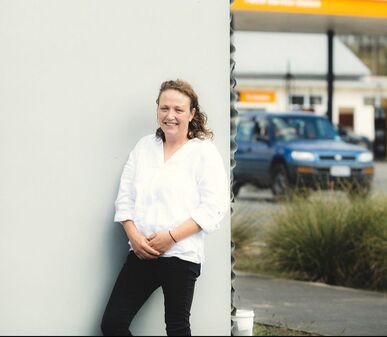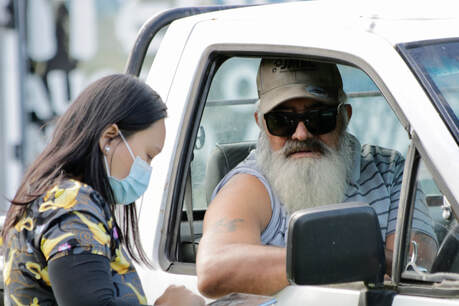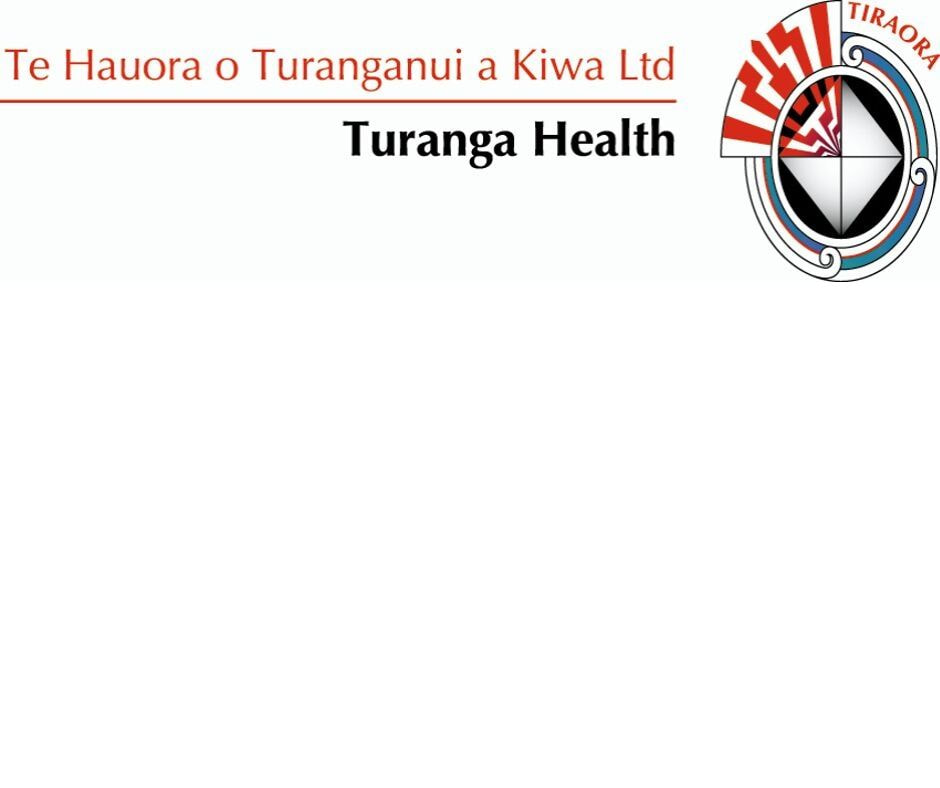 TURANGA Health medical staff and kaiāwhina stranded behind closed roads west of Gisborne in June continued to look after unwell whānau during the state of emergency. “On the ground decision-making is vital during these times and we had the right people in the right places to help whānau who were most unwell,” says the health organisation’s chief executive Reweti Ropiha. After a period of intense rain a state of emergency was declared in Tairāwhiti on Thursday 22 June. Flooding, slips, and dropouts closed dozens of rural roads as well as State Highway 2 west out of Gisborne. Te Karaka whānau were evacuated, Whatatutu residents were cut off, and Otoko Hill sustained major damage. A number of Turanga Health staff were trapped behind the damaged roads including primary care kaiwhakahaere Bobbie Cameron in Whatatutu, community coordinator Mary Fisher in Matawai, and Waikohu Health Centre nurse practitioner Kylie Morresey in Kanakanaia Rd. With support from other Turanga Health nurses and kaiāwhina they all continued to work. Heeding the early severe weather warnings, Waikohu Health Centre nurse practitioner Kylie Morresey and nurse Vinessa Taylor cleared the next day’s patient list with phone calls. Then they stocked their trucks with mobile nursing equipment including medication, inhalers, dressings, and oxygen and headed to their respective homes to wait out the storm. Once the rain hit, Whatatutu-based nurses Bobbie and Vinessa, and kaiāwhina Layton Noanoa and Leslie Puketapu, were part of an iwi welfare response hub based out of Mangatu Marae. The Turanga Health staff did door-to-door checks on Whatatutu locals. “We’d keep them up to date with the situation and see if they needed any support or medicine,” says Bobbie. Layton maintained a database with names of who had received support and fed the information to the civil defense team operating out of Te Karaka Area School. Practice nurse Vinessa was particularly concerned with a potential loss of power and the impact that would have on patients who rely on dialysis and oxygen machines. “They are the sickest people out here, but I know them well because I work at the Health Centre. Turanga Health is really responsive. It’s great.” Bobbie says the lessons learned from Cyclone Gabrielle in February, and a recent emergency planning exercise, meant Whatatutu was as prepared as it could be. “Everyone worked in really well.” Kylie was trapped in Kanakanaia Rd. As a nurse practitioner with some of the same authorisations as a doctor, Kylie can prescribe medicine. As Bobbie and Vinessa assessed patients they could ring Kylie who could then prescribe medicine over the phone. “Living in the community and being a prescriber when roads are closed is a huge benefit,” says Kylie. “People were still being treated even though they were isolated.” Further up broken State Highway 2, community coordinator Mary Fisher from Matawai, faced challenges opening a drop-in nurse clinic at Matawai Memorial Hall. Mary helped whānau who needed dressings and checkups and was a friendly face to anyone who was worried. But just getting to Matawai village was arduous. Mary’s husband used a tractor to punch through slips near her home. Then she had to walk one kilometre to a car she’d stashed further down the slushy road. “It’s just what we’ve got used to,” says Mary. Once out and about, Mary also visited vulnerable whānau in the area. “The whole thing had an element of de ja vu about it,” admits Reweti. “We took all our learnings from the previous emergencies. I’m proud of how our rural staff seamlessly mobilised into action. It’s a vital reminder of the value of Turanga Health’s depth of professionalism and geographic spread.”
0 Comments
 TURANGA Health administered nearly 10 percent of the country’s total Covid booster immunisations in four hours during one day in Patutahi in April. Community providers are leading the charge for immunisation, says Turanga Health chief executive Reweti Ropiha. “No appointments, no queues, close to home, and all with a friendly face.” Turanga Health has led the region in its winter preparedness by taking its vaccination drive-through events around the rohe since April. Whānau can get Covid-19, influenza, childhood, and hapū wahine vaccinations at the one-stop venues. They look and feel like the Covid-19 vaccination clinics of old because that’s what they’re modelled on, says Mr Ropiha. “This is a good alternative to the bricks and mortar style of immunisation which in these new times has been proven not to work.” On Sunday 30 April, outside Ngatapa Rugby and Associated Sports Club, Turanga Health staff administered 256 vaccines in four hours. Of those, 61 were adult or child Covid vaccinations, 164 were to prevent influenza, and 21 were childhood immunisations. Mr Ropiha says the community vaccination event was led by kaimahi that people know, in a place that people feel comfortable. It’s how Turanga Health delivers most of its vaccinations and it equates to higher vaccine uptake. “That day we were responsible for 9.6 percent of all boosters administered across Aotearoa that day. It shows us that drive-throughs are a familiar concept and attract more people.” The experience we offer fosters goodwill and participation which is vital right now as we see vaccination figures declining around Aotearoa, added Mr Ropiha. Childhood immunisation rates have fallen to critical levels, a recent Immunisation Taskforce report has found. The report says that at 6 months of age, just 45.9% of Māori were fully immunised compared with 72.8% for Pākehā. Worryingly, that immunisation rate for pēpi Māori has dropped down drastically from 80 percent in early 2020. The decline in childhood immunisation is now putting our tamariki at real risk of preventable diseases, says Mr Ropiha. Three babies have died from vaccine-preventable whooping cough this year. “The best way we can protect ourselves is to ensure māmā are vaccinated and pēpi get their first immunisations at 6 weeks, 3 months, and 5 months." By the end of April, Turanga Health had held 11 rural and town drive-through vaccination clinics (30 hours), 8 workplace clinics (16 hours), and 5 Turanga Health clinics (8 hours). In April 1,232 vaccinations were administered during the 30 hours of community clinics, equating to nearly 1.5 vaccinations a minute. “The one-location drive-throughs are an efficient, convenient, and safe way to vaccinate large groups of people in town or smaller groups in rural areas.” Figures show that Māori participation in Turanga Health’s community clinics was just over 50 percent, and just over 40 percent in the workplace settings. Mr Ropiha says male and female kaiāwhina trained vaccinators make a difference at the drive-throughs. Formerly the realm of nurses, Turanga Health was this country’s first iwi health provider to train kaiāwhina to vaccinate. The organisation now boasts 15 kaiāwhina vaccinators providing a range of immunisations. Ten of them are involved in training to be able to administer a vaccination they are not currently qualified for. Staff mostly work outside, and Cyclone Gabrielle didn’t dampen Turanga Health’s efforts to vaccinate. “Turanga Health continued its mahi straight after Cyclone Gabrielle and that continuity of care seamlessly moved into winter and childhood vaccinations.” At each vaccination event Turanga Health invites whānau feedback. Most people discover the drive-throughs through word of mouth, and they attend to improve their health or to support other whānau. Many say they come just to connect. In April whānau were asked to rate their satisfaction with Turanga Health’s vaccination events as a percentage. The Elgin vaccination day scored 84 percent, Manutuke 85, and Patutahi 98. “As an iwi health provider, we’ve been charged with taking a bigger role in strengthening kaupapa Māori services. Māori-led initiatives like this build the resilience of vulnerable Māori communities and help manage the impact of avoidable disease.” Mr Ropiha says drive-through vaccinations are here to stay and will undoubtedly lead to better outcomes for iwi health. One-location vaccine drive-through clinics are coming to a town or village near you. Visit www.turangahealth.co.nz to see where the next vaccination clinic is being held. |
Media Releases
Email us if you want to receive our media releases. Archives
February 2024
|


